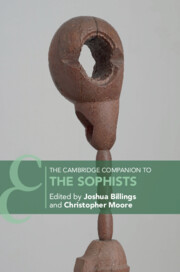Book contents
- The Cambridge Companion to the Sophists
- Other Volumes in the Series of Cambridge Companions
- The Cambridge Companion to the Sophists
- Copyright page
- Contents
- Contributors
- Note on the Text
- Introduction
- Part I Contexts
- 1 Sophia before the Sophists
- 2 The Sophists between Aristocracy and Democracy
- 3 The Professional Lives of the Sophists
- 4 The Sophists in the Fifth-Century Enlightenment
- Part II Thought
- Part III Receptions
- Appendix: The People of the Sophistic Period
- Select Bibliography
- Index
- OTHER VOLUMES IN THE SERIES OF CAMBRIDGE COMPANIONS (continued from page ii)
1 - Sophia before the Sophists
from Part I - Contexts
Published online by Cambridge University Press: 23 December 2023
- The Cambridge Companion to the Sophists
- Other Volumes in the Series of Cambridge Companions
- The Cambridge Companion to the Sophists
- Copyright page
- Contents
- Contributors
- Note on the Text
- Introduction
- Part I Contexts
- 1 Sophia before the Sophists
- 2 The Sophists between Aristocracy and Democracy
- 3 The Professional Lives of the Sophists
- 4 The Sophists in the Fifth-Century Enlightenment
- Part II Thought
- Part III Receptions
- Appendix: The People of the Sophistic Period
- Select Bibliography
- Index
- OTHER VOLUMES IN THE SERIES OF CAMBRIDGE COMPANIONS (continued from page ii)
Summary
This chapter locates the Sophists within the context of earlier Greek wisdom traditions and efforts by a variety of individuals (from Hesiod to Parmenides and Pindar) to establish and communicate their own poetic and/or intellectual authority. The Sophists participated in long-standing debates over the relationship between sophia and technê, and over tensions surrounding physical versus intellectual skills, learning, and teaching. They also looked back to the practice of wisdom and maxim collection. There was no dominant tradition under which one could unify the manifestations of sophia in Archaic and early Classical Greece; this complexity was an important aspect of the sophistic inheritance, and is the background against which we must measure individual efforts to claim distinctive achievement. The analysis traces the importance of Hesiodic and quasi-Hesiodic wisdom collections, the emergence of the inquiry into nature and of intellectual and cultural experts known as “sages” (sophoi), and the representation of sophia in sympotic and epinician poetry.
- Type
- Chapter
- Information
- The Cambridge Companion to the Sophists , pp. 33 - 68Publisher: Cambridge University PressPrint publication year: 2023

